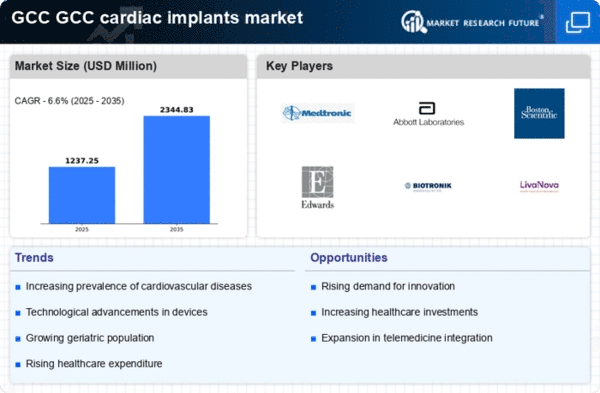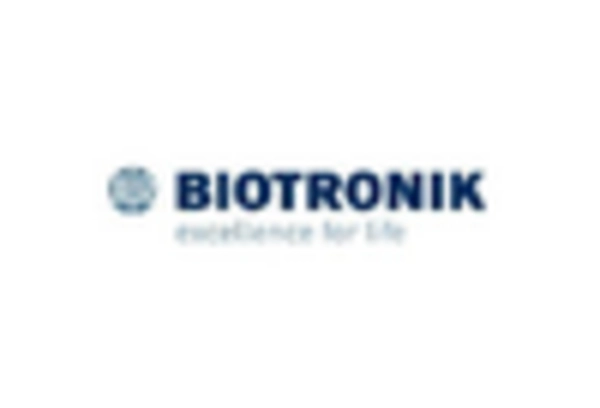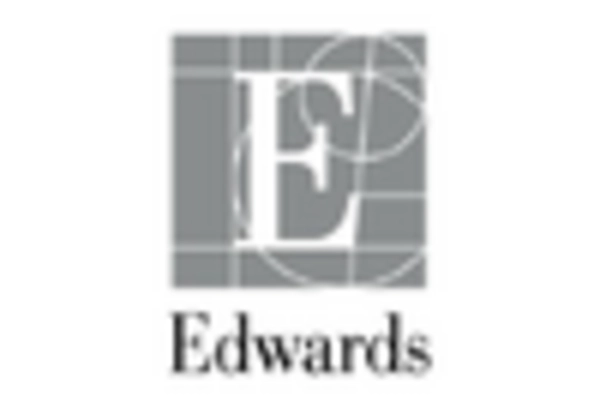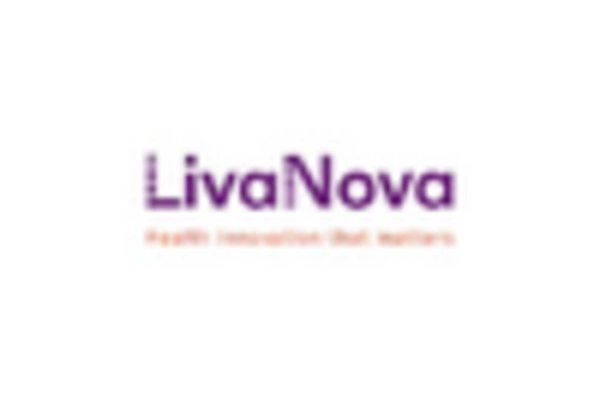Increasing Aging Population
The aging population in the GCC region is a crucial driver for the cardiac implants market. As life expectancy rises, the prevalence of age-related cardiovascular diseases increases, necessitating advanced medical interventions. It is estimated that by 2030, the population aged 60 and above in the GCC will reach approximately 20% of the total population. This demographic shift is likely to lead to a higher demand for cardiac implants, as older individuals are more susceptible to heart conditions. Consequently, healthcare providers are focusing on enhancing their cardiac care services, which may result in increased investments in cardiac implants. The cardiac implants market is expected to grow significantly as healthcare systems adapt to meet the needs of this aging demographic, potentially leading to a market value exceeding $1 billion by 2027.
Rising Healthcare Expenditure
Healthcare expenditure in the GCC is on an upward trajectory, which is likely to bolster the cardiac implants market. Governments in the region are investing heavily in healthcare infrastructure, aiming to improve the quality of care and access to advanced medical technologies. In 2025, healthcare spending in the GCC is projected to reach around $200 billion, with a significant portion allocated to cardiovascular health. This increase in funding is expected to facilitate the adoption of innovative cardiac implant technologies, enhancing patient outcomes. Furthermore, as healthcare systems evolve, there is a growing emphasis on preventive care and early intervention, which may further drive the demand for cardiac implants. The cardiac implants market could see substantial growth as a result of these investments, potentially leading to improved healthcare delivery and patient satisfaction.
Growing Awareness of Heart Health
There is a notable increase in awareness regarding heart health among the population in the GCC, which is positively impacting the cardiac implants market. Public health campaigns and educational initiatives are encouraging individuals to prioritize cardiovascular health, leading to earlier diagnosis and treatment of heart conditions. This heightened awareness is likely to result in more patients seeking medical intervention, including the use of cardiac implants. In 2025, it is estimated that around 30% of the population will have undergone screening for cardiovascular diseases, compared to 15% in previous years. This shift in behavior may drive demand for cardiac implants, as more individuals are diagnosed with conditions that require surgical intervention. Consequently, the cardiac implants market is expected to benefit from this growing focus on heart health, potentially leading to increased sales and market penetration.
Regulatory Support for Medical Devices
Regulatory support for medical devices in the GCC is emerging as a significant driver for the cardiac implants market. Governments are streamlining approval processes for innovative medical technologies, which is likely to facilitate faster market entry for new cardiac implants. The establishment of regulatory frameworks that prioritize patient safety while promoting innovation is essential for the growth of the market. In 2025, it is anticipated that the time taken for regulatory approvals will decrease by approximately 20%, enabling manufacturers to bring their products to market more efficiently. This supportive regulatory environment may encourage investment in research and development, leading to the introduction of cutting-edge cardiac devices. As a result, the cardiac implants market could experience accelerated growth, with an influx of new products that meet the evolving needs of patients and healthcare providers.
Technological Innovations in Cardiac Devices
Technological innovations are transforming the cardiac implants market, particularly in the GCC region. Advances in materials science, miniaturization, and biocompatibility are leading to the development of more effective and safer cardiac devices. For instance, the introduction of bioresorbable stents and advanced pacemakers is revolutionizing treatment options for patients with heart conditions. The market for cardiac implants is projected to grow at a CAGR of approximately 8% from 2025 to 2030, driven by these innovations. Additionally, the integration of digital health technologies, such as remote monitoring and telemedicine, is enhancing patient management and follow-up care. As healthcare providers increasingly adopt these technologies, the cardiac implants market is likely to expand, offering patients improved treatment options and outcomes.
















